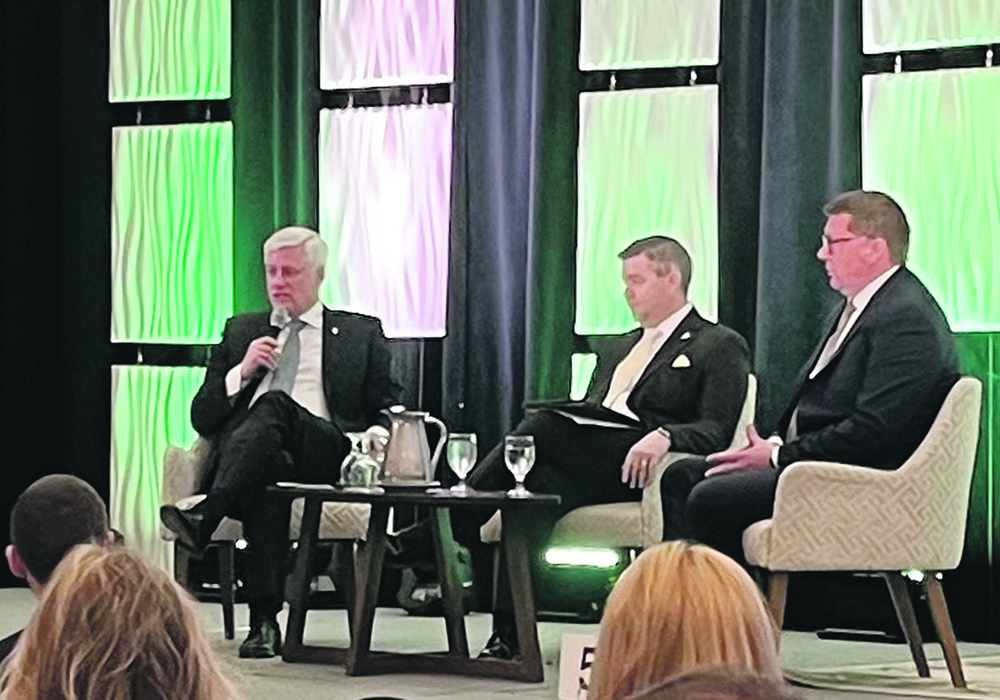Stephen Harper says he admires how well the province has been able to market its agrifood products around the world
REGINA — Former prime minister Stephen Harper says Saskatchewan has a positive story to tell and is doing a good job of sharing that story around the world.
“One of the really great trends in my political life has been the transformation process of Saskatchewan,” he said during the Food, Fuel and Fertilizer global summit, held by the Saskatchewan Chamber of Commerce in Regina last week.
Other stories from the Food, Fuel, Fertilizer Global Summit:
- Prairie producers contribute to food aid
- Regulatory certainty called vital to Regina project’s future
Harper said when he was young the province was considered one of the least entrepreneurial parts of the country, but that has changed.
Read Also

Canadian Food Inspection Agency extends chronic wasting disease control program consultation deadline
Date extended for consultation period of changes to CWD program
Among all the provinces, Saskatchewan has been able to use trade agreements signed by the federal government to build relationships that translate into business, he said.
Doing business in most of the world is not like doing business with the United States, he told the room full of business and agricultural leaders.
There, the discussion is about profit and cost and contracts.
But in most of the world, it’s about developing relationships, Harper said.
“Complements to the government of Saskatchewan for realizing this and for getting out there and developing those relationships that are allowing the exporters in this country to really radically expand,” he said.
In 2023, Saskatchewan’s agri-food exports totalled $20.2 billion, up from $18.5 billion the previous year and 74 per cent higher than 2013. The top commodities were non-durum wheat, canola seed, canola oil, durum, lentils and canola meal.
The top markets were the U.S., China, Japan, Mexico, Algeria, India, Morocco, Italy, Indonesia and Turkey.
Premier Scott Moe said a strong relationship is why India reinstated the Saskatchewan trade commissioner earlier this month, even as diplomatic relations between India and Canada have deteriorated.
About 25 per cent of Canada’s trade with India comes from Saskatchewan. In 2023, exports totalled $5.1 billion: about $1.3 billion came from Saskatchewan and $700 million of that was agricultural.
Provincial export minister Jeremy Harrison said Saskatchewan is seen as a reliable trading partner for countries looking for long-term energy and food security in an uncertain world. Russia’s invasion of Ukraine has forced many countries to consider where they purchase their commodities.
Harper said the world is coming through what he calls a period of “naïve globalism.”
“What I mean by that is we had this rapid expansion of global markets, but to the point where we neglected the very real security risks that existed in some of these markets,” he said.
“There was an assumption that took hold after the Cold War that the differences in political systems and the rivalries between them were negligible…We now know that assumption was ridiculous.”
He said the world is looking to acquire critical minerals, commodities and food from stable places far away from conflict zones.
“And guess where that should be?” he said.
Harper criticized the current federal government for not seeing the opportunity and said he found it “astounding” that because the Liberals don’t have seats in Saskatchewan they don’t work on its behalf.
He said he never won seats in the Montreal area but still supported the city as an aerospace centre.
“This federal government is great for me,” he said.
“When I go around the world, are they ever glad to see me.”
The former prime minister added that the economy matters more than anything else. A government that gets that right can deal with a lot of other things, he said.
















